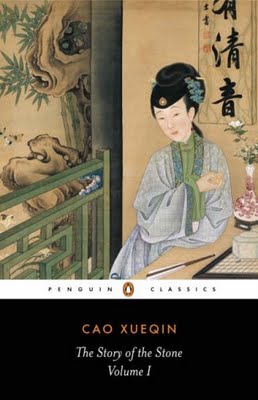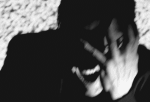 A couple of things left from the other post. I’m surprised to find here traces of “self-awareness” and use of playful circular devices that are so typical of Postmodernism.
A couple of things left from the other post. I’m surprised to find here traces of “self-awareness” and use of playful circular devices that are so typical of Postmodernism.
I’ll continue to quote parts of the introduction:
But for all the little hair-cracks that the scholar’s magnifying glass reveals, The Story of the Stone is an amazing achievement and the psychological insight and sophisticated humour with which it is written can often delude a reader into judging it as if it were a modern novel. In fact neither the idea that fiction can be created out of the author’s own experience, nor the idea that it can be concerned as much with inner experience – with motives, attitudes and feelings – as with outward events, both of which are a commonplace with us, had been so much as dreamed of in Xueqin’s day.
As regards the various ‘devices’ which Xueqin employs for converting remembered fact into artistic fiction, one he makes persistent use throughout the novel is the antinomy of zhen and jia, meaning respectively ‘real’ and ‘imaginary’, but both regarded by Xueqin as being different parts of a single underlying Reality:
Truth becomes fiction when the fiction’s true
Real becomes not-real when the unreal’s real
is the inscription written up over the gateway to the Land of Illusion which we pass through at the beginning of the novel.
‘Jia’, the surname of the family in the novel, is also a pun on this other jia which means ‘fictitious’. The Jias of the novel are connected in various ways with a mysterious family in Nanking called the Zhens – another word-play – who are a sort of mirror-reflection of the Jia family.
It is easy to imagine that many of the Stone‘s ‘devices’ had their genesis at this stage: the presentation of fiction and reality or reality and illusion or the waking world and the dreaming world as opposite sides of a sort of single super-reality, for example – like the two worlds one on each side of the mirror.
All of it sounding weirdly close to the topic of my blog in the past weeks. No matter what stuff I pick up, I end up again and again in the same places.
What surprises me here is how deliberate it is all, and not really a strained interpretation of today. What Xueqin was doing was about redressing his family and people he knew as fiction, this is a common practice. But he was doing this by incorporating in the novel the awareness for its own device, and so all this playful interplay of fiction with reality, that probably comes back as one of the key to interpret the “secret” of this novel.
Such devices play a functional part in the structure of the novel; but many of the symbols, word-plays and secret patterns with which the novel abounds seem to be used out of sheer ebullience, as though the author was playing some sort of game with himself and did not much care whether he was observed or not.
And finally another striking feature of this novel is that it seems to have its core on the women. Something that is discussed right at the beginning of the book, in Postmodern style as the book describes its own possible frameworks, merits and limits. A sort of self-dialogue:
it contains no examples of moral grandeur among its characters – no statesmanship, no social message of any kind. All I can find in it, in fact, are a number of females, conspicuous, if at all, only for their passion or folly or for some trifling talent or insignificant virtue. Even if I were to copy all this out, I cannot see that it would make a very remarkable book.
‘What makes these romances even more detestable is the stilted, bombastic language – inanities dressed in pompous rhetoric, remote alike from nature and common sense and teeming with the grossest absurdities.
‘Surely my “number of females”, whom I spent half a lifetime studying with my own eyes and ears, are preferable to this kind of stuff? I do not claim that they are better people than the ones who appear in books written before my lifetime; I am only saying that the contemplation of their actions and motives may prove a more effective antidote to boredom and melancholy.
‘All that my story narrates, the meetings and partings, the joys and sorrows, the ups and downs of fortune, are recorded exactly as they happened. I have not dared to add the tiniest bit of touching-up, for fear of losing the true picture.’
As consequence of all this, Vanitas, starting off in the Void (which is Truth) came to the contemplation of Form (which is Illusion); and from Form engendered Passion; and by communicating Passion, entered again into Form; and from Form awoke to the Void (which is Truth).
Having made an utter failure of my life, I found myself one day, in the midst of my poverty and wretchedness, thinking about the female companions of my youth. As I went over them one by one, examining and comparing them in my mind’s eye, it suddenly came over me that those slips of girls – which is all they were then – were in every way, both morally and intellectually, superior to the ‘grave and mustachioed signior’ I am now supposed to have become. The realization brought with it an overpowering sense of shame and remorse, and for a while I was plunged in the deepest despair. There and then I resolved to make a record of all the recollections of those days I could muster – those golden days when I dressed in silk and ate delicately, when we still nestled in the protecting shadow of the Ancestors and Heaven still smiled on us.
I might lack learning and literary aptitude, but what was to prevent me from turning it into a story and writing it in the vernacular? In this way the memorial to my beloved girls could at one and the same time serve as a source of harmless entertainment and as a warning to those who were in the same predicament as myself but who were still in need of awakening.

 A couple of things left from the other post. I’m surprised to find here traces of “self-awareness” and use of playful circular devices that are so typical of Postmodernism.
A couple of things left from the other post. I’m surprised to find here traces of “self-awareness” and use of playful circular devices that are so typical of Postmodernism. I received today the first volume (of five, for a total of 2500 pages, give or take) of “The Story of the Stone”, better known as “The Dream of the Red Chamber”. One of the
I received today the first volume (of five, for a total of 2500 pages, give or take) of “The Story of the Stone”, better known as “The Dream of the Red Chamber”. One of the  Surfing the Bakker’s wave. Consciousness and whatnot. I just found an interesting link in a comment to an article linked on a forum thread about a Bakker’s story (and this is an example of typical internet loop that is actually quite SHORT).
Surfing the Bakker’s wave. Consciousness and whatnot. I just found an interesting link in a comment to an article linked on a forum thread about a Bakker’s story (and this is an example of typical internet loop that is actually quite SHORT).